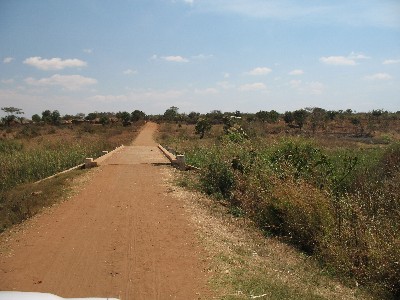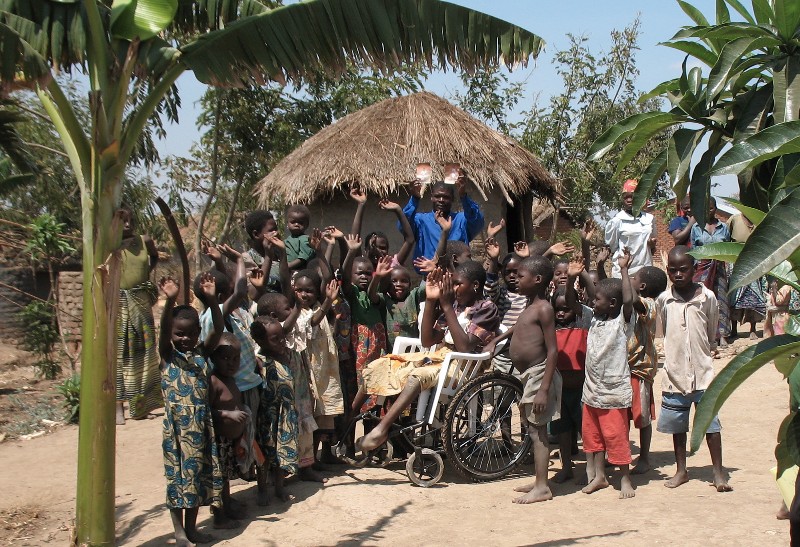
We put the white wheelchair in the back of the white Isuzu KB 250 LE and pull away from Blessings. “It is just near”, states Henry Mwale, the uncle (or other father) of the handicapped girl. “We are near the airport.” I can’t recall the number of times that “just near” has been a very long distance. It’s all in the understanding of the language, and I don’t mean the difference between English and Chichewa. To a Malawian the term “just near” means you are traveling in a car of “galimoto”, and not walking. “Near the airport,” however, should mean something altogether different. After all, we can see the control tower from in front of Blessings Hospital.
Left At The Airport “T” Road
We drive down the long hill and into the Lumbadzi Trading Center, then a quick turn to the left at the only intersection in town. We go down to the dry river valley, then up the other side of the grade. A left turn at the airport “T” road puts us directly on course to enter the airport terminal not far to the southwest.
“Turn”, Henry says abruptly. No one warns you three or four car lengths ahead. Most people in this part of the world walk, so they do not think to warn you before you get directly in the turn off. “Where,” I ask? Looking to the right I can see nothing but a paved footpath leading off toward the airport property. We are in a small trading area called Mchcea, and there is no road to the right. A few yards on down the road we make a quick u-turn on the narrow tarmac and return slowly toward the footpath. Henry must know what he is talking about. This is his neighborhood. Finally we locate a near invisible set of tire ruts near the footpath and conclude this must be the “right road”. Our wheels drop off the safety of the tarmac, and down into the haven for ruts and potholes. For a few yards our tires straddle the footpath, putting us in competition with the oncoming bicycles and pedestrians on foot. Then we make a right turn at the bamboo tomato stand, and bounce along through a stand of 10 to 12 foot high trees, and foot deep potholes. The road narrows as we pass a woman a woman with a green top, a white natinji and a brown basket on her head. Just beside her is another girl with a brown natinji, a green top and a red bucket. Behind them on our side of the narrow bridge are a number of other pedestrians. We keep to the left so we do not hit them with our mirror. This is the demarcation line between the Lilongwe District and the Dowa District. The road moves cautiously through a tiny village on the uphill side, then another right turn beside the ten goats seems it is about to put an end to any semblance of a road. It is now a path, and probably getting near to the end of its life span. We are running along a ridge and off the to the right we can actually see the roof of Blessings Hospital. It is within sight of the little girl. I wonder if she ever looks our way and wishes someone would come to rescue her from her walk less plight? Off to our right, only a few hundred yards, is the perimeter fence for the airport authority.
We reach Chiotha Village. It rests in the Dowa District, under the tribal authority of Chief Mkukula. As we enter the village it seems pandemonium has erupted as if it were on some sort of schedule. Goats bleat, and appear to run off in every direction. Dogs bark, and run along beside the car. Children shout, and wave as they try to keep up with the slow moving vehicle. A big fat pig hurries across the road as though trying to converge into a single parade line so they can participate in the moment that is about to take place. Finally, a million jolts since we started, we reach a tiny, tiny house near the place where a group of women are sitting on the ground talking just outside a hut.
The laughing children surround the car and begin a waving marathon as though not to miss even the remotest possibility of being including in a Kodak moment.
Henry is out of the Isuzu in a split moment and has the wheelchair waiting on the ground before a writer can reach for pen and paper. He is taking no chances on loosing out on this marvelous device. From a tiny hut crawls 16-year-old Mauusiyeko Mwale. She looks at the wheelchair, then at her uncle, then the azungu’s who have brought the wheelchair to her. Henry quickly picks her up, and places her in the all terrain chair. It is evident the landscape just a few kilometers away from the modern airline terminal will certainly be a challenge for any wheeled means of transportation.
This young woman, born on November 16, 1990, does not know her father, nor would she know her mother if she passed her on the street. All she knows is that her mother was a prostitute who came back to her home village in order to dump off her baby daughter with an uncle. She knows the chief was said to have been so angry at the neglect of this child that the mother was banned from over returning to her home village. It has been true ever since Mauusiyeko was a baby.
The young girl sits in her new wheelchair, and looks around. Now she can come outside with the rest of the children without having to drag herself through the dirt.
Greetings are extended all around, and are conveyed even to the smallest of the children gathered to see the strange galimoto named “Blessings Hospital.” Only the tiniest cry of fear is heard from someone in the back of the crowd concerning the strange white face that has come to their village so unexpectedly.
Abruptly a South African air flight wings its way upward from just beyond the ridge, and just as abruptly a woman walks past the group with a basket of unknown substance perched precautious on her head.
The uncle who has cared for the little girl for so many years, picks the girl up, and places her limp body in the chair. She begins to wave at the camera, as do all of the other village children who have gathered around the strange, white faces. The 16-year-old continues to smile, and to wave to the people who have come so unexpectedly.
A few more pictures and the Isuzu engine springs to life. Mauusiyeko’s name is added to the list of those who have, and will, receive one of the chairs from a recent shipment of 550 chairs from the Freewheelchair Mission in Costa Mesa, California, through the efforts of the Malawi Project. The Isuzu retreats back down the tiny path toward M-1, Lumbadzi and home. The back of the vehicle is empty. It is a good feeling.

